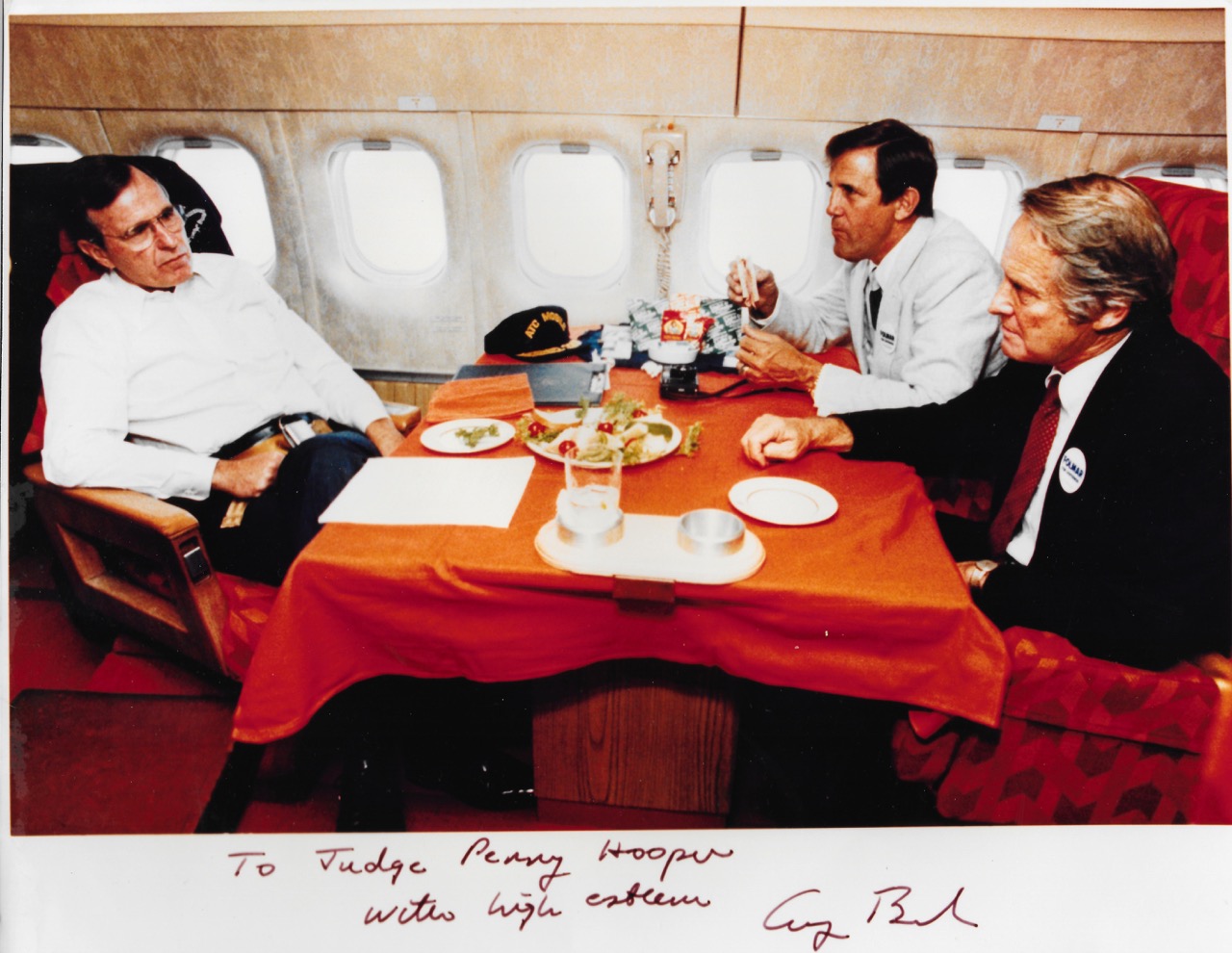
Perry Hooper (right) with George H.W. Bush aboard Air Force One
By Glynn Wilson –
Perry Oliver Hooper Sr., the “baby daddy” of Nixon’s racist “Dixie Strategy” in Alabama, died Sunday at his home in Montgomery. He was 91.
While he is being honored by Republicans all over the state this week, it might also be a time to remember the damage he caused.
Hooper is being remembered as the first Republican elected as Chief Justice of the Alabama Supreme Court in 1994. But what no one else is reporting is that it was political operative Karl Rove who helped Hooper and other conservative, pro-big business Republicans take over the Supreme Court and ultimately the governor’s office and the State House.
How Karl Rove Took Over the Alabama Supreme Court and Created a ‘No Win Zone’ for Citizens
Mark Kennedy, the son-in-law of governor George Wallace, was the first state Supreme Court Justice targeted by Rove, who came to work for a University of Alabama Law School professor named Harold See at the behest of the Business Council of Alabama in the early 1990s. It was and is still run by Bill Canary who had worked as a political operative for George H.W. Bush. Rove’s political consulting firm started in Texas when he helped get George W. Bush elected governor over Ann Richards, but he found willing clients in Alabama.
Before being elected to the state Supreme Court, Kennedy served as a juvenile judge and family-court judge, where he saw the negative plight of abused children who ended up in the justice system. In light of his experiences, he helped start the Children’s Trust Fund of Alabama and later the Corporate Foundation for Children and served as president of the National Committee to Prevent Child Abuse and Neglect. Kennedy’s campaign commercials showed his volunteer work, and included pictures of him holding hands with children he had helped.
Rove took those innocent pictures and, in the early days of the Internet, got Republican operatives at the University of Alabama Law School and the secretive, conservative Federalist Society to e-mail around an attack ad claiming Kennedy was a gay pedophile. It was not unlike the “whispering campaign” he used in Texas to get Bush elected over Ann Richards, who he accused of being a lesbian in similar fashion.
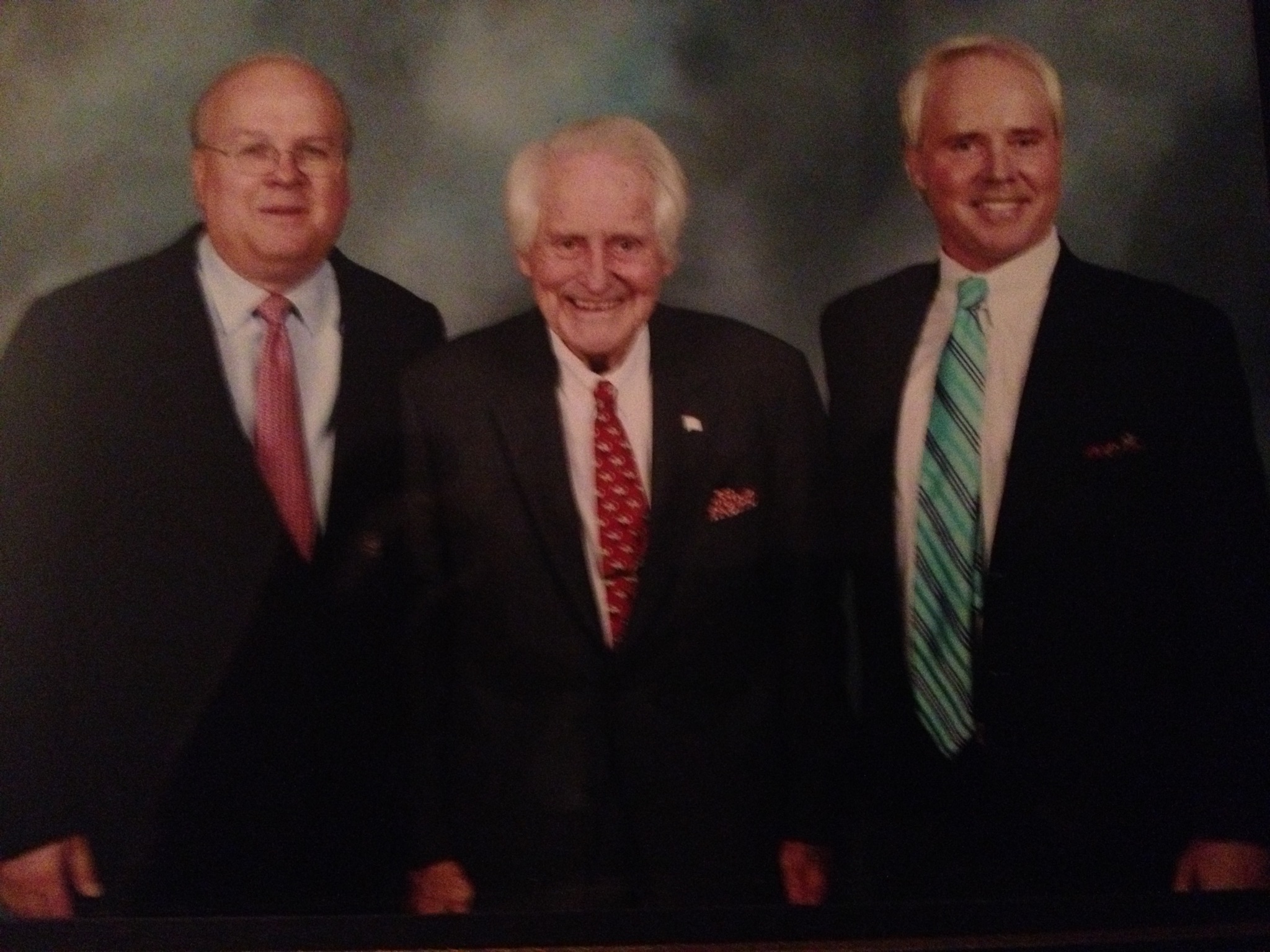
Karl Rove (left) seen here with Perry Hooper Sr. and Jr.
“Karl Rove is a expert at turning what you believe to be your strongest suit into being your worst nightmare, kind of like the Swiftboat ads,” Kennedy said. “He accused me of being a pedophile.”
Kennedy actually beat Rove and his candidate in that first race, barely, but he was so shaken by the dirty campaign tactics that he decided not to seek another term and face Rove again in 1998.
Watch This Video Interview with Judge Mark Kennedy
Rove also exaggerated the issue of large jury awards and turned “tort reform” into a campaign issue, accusing judges like Kennedy of being “too liberal” and guilty of “jackpot justice.” With those misleading tactics, he managed to take over the Texas and Alabama appellate court systems by getting conservative, pro-big business Republicans elected. Over time the Alabama Supreme Court and the Court of Civil Appeals became a “no win zone” for any average Alabamian seeking justice for a grievance against any corporate entity that wronged them. Big insurance companies loved this, so they chipped in millions to Rove’s campaigns after that and still support him to this day in a big way.
Republican strategist Karl Rove is now being quoted as saying of Hooper’s time on the RNC: “For his work with five GOP presidents – Nixon, Ford, Reagan, George H.W. Bush and George W. Bush – he was highly respected by all national Republican leaders. But his greatest impact came in encouraging young Alabamians to seek office in the state as Republicans and then helping them win.”
Hooper’s political career actually goes back to 1964, when arch-conservative Barry Goldwater ran for president against Lyndon Johnson and opened up a racist, southern front for Republicans to begin taking over southern politics. Goldwater carried Alabama, bringing Hooper and a few other Republicans into office on his political coattails. Hooper was elected probate judge of Montgomery County, the first Republican to gain that seat since the 19th century. He continued in that position, handling wills, successions and estate transactions during the civil rights movement that also swept the South in the 1960s, until 1974, when he was elected to a judgeship in the state’s 15th judicial circuit.
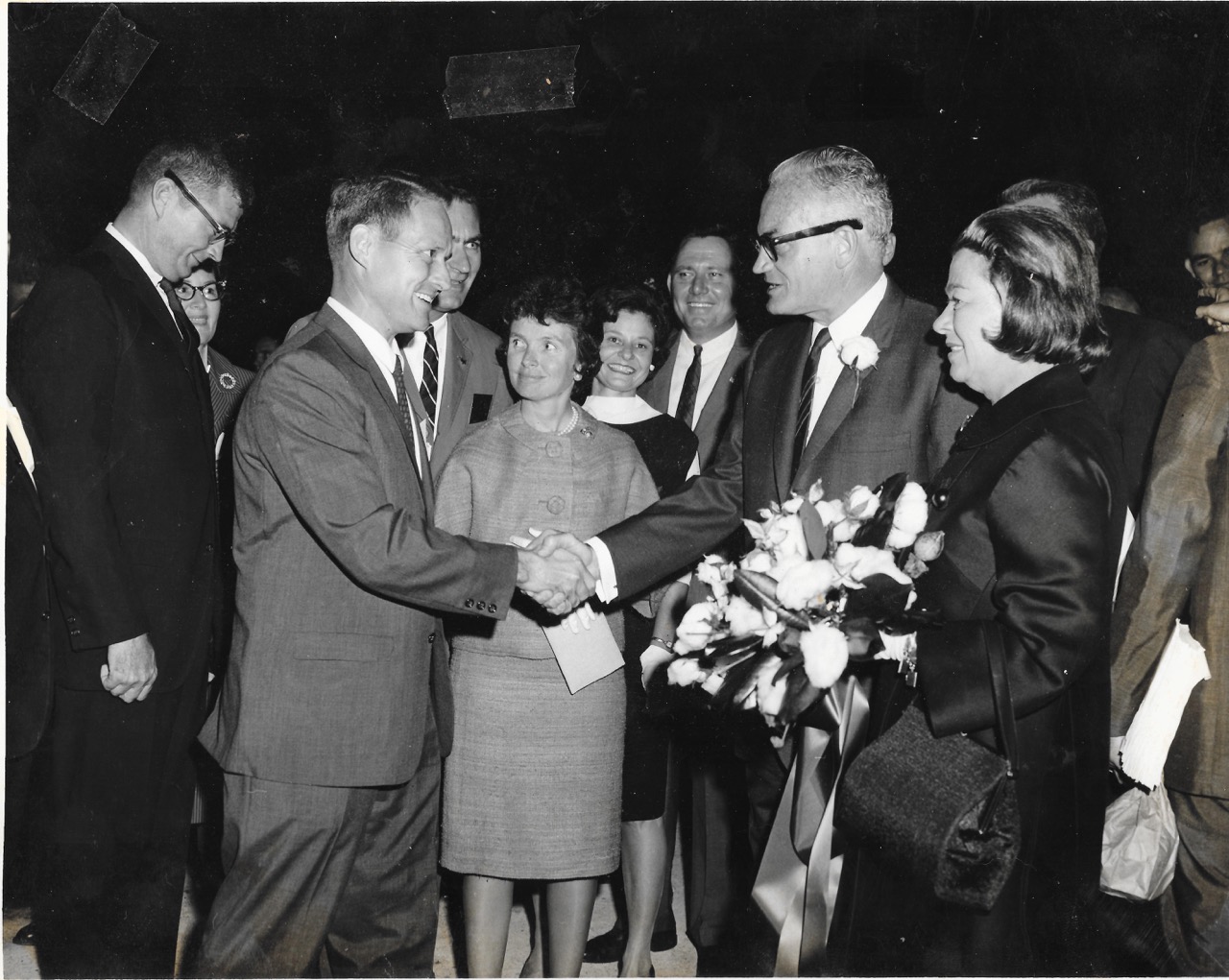
Perry Hooper with Presidential candidate Barry Goldwater in the early 1960s
During his race in 1964, he became somewhat famous for the slogan: “Put Barry in the White House and Perry in the Court House.” He became known as a “Goldwater Republican,” code for the racist wing of the party. Richard Nixon picked up on that in his runs for president in 1968 and 1972, when he faced opposition from Alabama’s George C. Wallace, who ran as an independent. Historians refer to this as Nixon’s “Dixie Strategy” or “Southern Strategy” to get white southern males to leave the Democratic Party and vote Republican on the basis of their racist views.
In 1968, Hooper was the Republican nominee for the U.S. Senate for the open seat vacated by retiring Democrat Lister Hill. He won the party nomination in a state convention presided over by subsequent state Rep. Bert Nettles, a lawyer then from Mobile. In the general election, Hooper received 201,277 votes (24 percent) to 638,774 (76 percent) for the Democratic nominee, former Lt. Gov. James B. Allen, a conservative whose views were similar to those of Hooper, according to Wikipedia and other sources.
Hooper polled 54,304 more votes in his statewide race than Nixon, the party’s presidential nominee. He narrowly held his home county and fared best among upper-income whites, with two thirds of the vote in higher socio-economic precincts in both Montgomery and Birmingham. Lower-income whites supported Allen by a wide margin. In eleven of the state’s sixty-seven counties, Hooper failed to reach double digits.
Years later, Hooper recalled that many voters “didn’t know” that he was in the race: “They only knew that George Wallace was carrying the banner [for President]… People didn’t dislike Nixon, they just liked Wallace, who sounded… Republican,” Hooper said.
Hooper returned to private practice in 1983, but then got back into politics in 1994 and, with Rove’s help, got elected as Chief Justice of the state Supreme Court, where he served until his retirement in 2001.
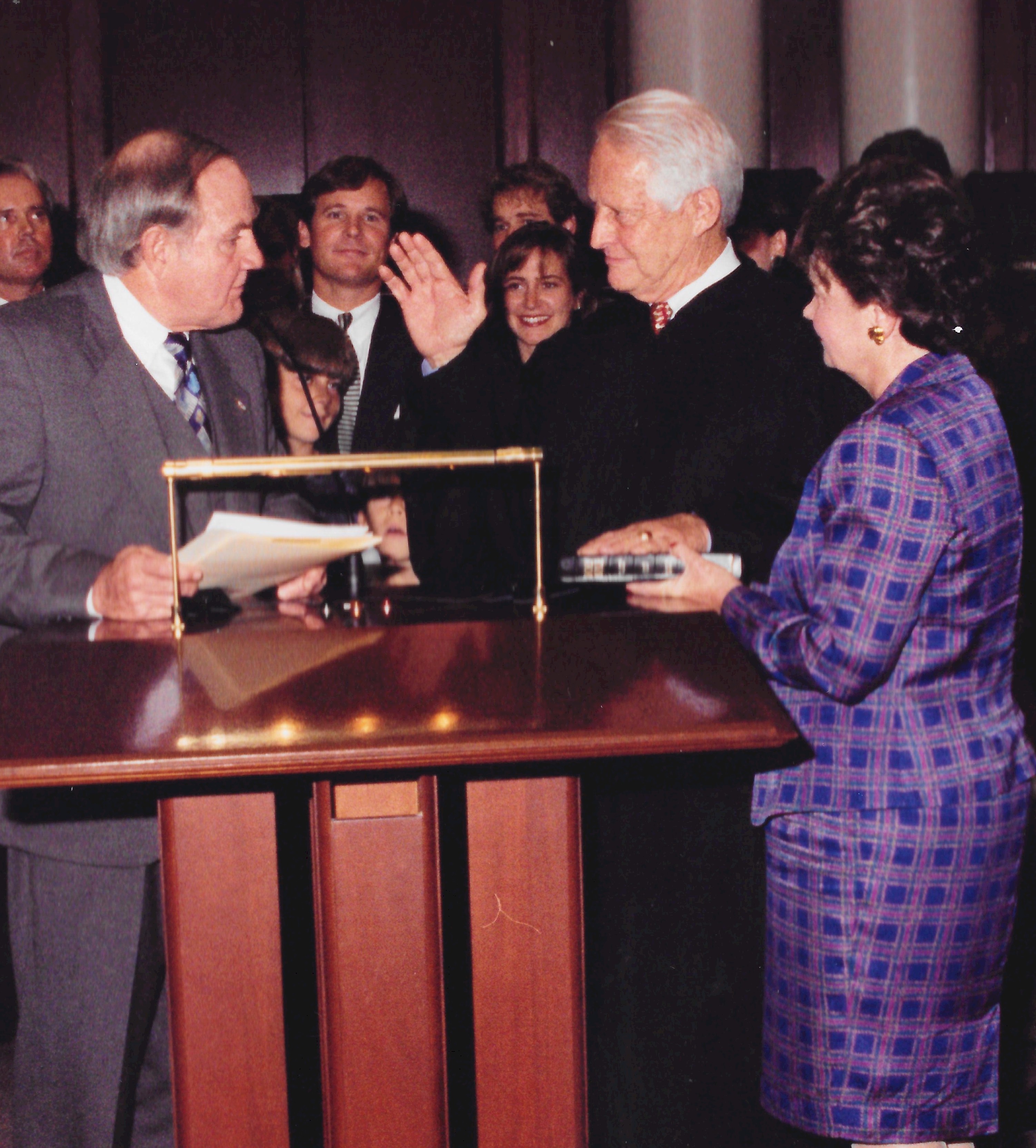
Alabama Gov. Fob James swearing in Chief Justice Perry Hooper in 1995
Former Governor Fob James, who swore Hooper into office in 1995, is being quoted as saying Hooper “set a wonderful example for judges and public servants to know the law. He knew the law,” he said. “And he was absolutely fearless in doing upfront what was right.”
From the perspective of others, Hooper used the long arm of the law to obliterate the notion that the courts should not discriminate against people on the basis of creed, color or station in life. His decisions routinely tossed out lawsuits against hospitals and other corporations, cases won in front of Alabama juries that were simply thrown out of court for supposedly hurting business recruiting to the state.
Upon hearing of Hooper’s death, Governor Robert Bentley issued a statement saying he was “saddened” by his passing.
“Chief Justice Hooper was the first Republican Chief Justice to be elected since Reconstruction, and he served our citizens with honesty and integrity during his time on the Supreme Court. He was a role model for many Republicans and valued public service. He was a Marine veteran and a strong family man. I know Alabamians join me in praying for his family, especially his wife Marilyn and their children, during this time.”
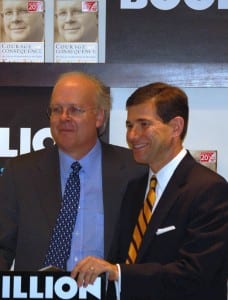
Karl Rove at a book signing in Birmingham with William “Bill” Pryor who President George W. Bush appointed to the U.S. Eleventh Circuit Court of Appeals in Atlanta as a political payoff for beginning the prosecution of former Alabama Governor Don Siegelman. Rove denied even knowing Pryor in a hearing before the House Judiciary Committee, even though he ran his campaign for Attorney General of Alabama in 1998. When Pryor greeted Rove at this event at Brookwood Mall, he said, “Hey bud,” and they hugged: Glynn Wilson
Upon hearing the news, former state Attorney General and U.S. Court of Appeals Judge Bill Pryor remembered Justice Hooper and the 1994 election.
“Perry Hooper’s election by a slim margin as Chief Justice of Alabama was a watershed event in our judicial history,” Pryor said in a statement. “It took the state and federal courts nearly a year to resolve the legal issues about that election, and throughout that litigation Chief Justice Hooper served as a model of quiet dignity and class. As Chief Justice, he led the restoration of the reputation of the Alabama judiciary for fairness and devotion to the rule of law. I will always appreciate Chief Justice Hooper’s efforts to assist me, as Attorney General, in creating the Alabama Sentencing Commission. My prayers are with the Hooper family, especially his beloved wife Marilyn.”
U.S. Senator Jeff Sessions called Hooper’s election to the state Supreme Court “an historic moment for the Alabama Republican Party.”
“After this event, Republican victories statewide became common and Democrat victories rare,” said Sessions, another racist conservative Republican who is still using that strategy to remain in power. “This determined man played a key role in the creation of a strong, often dominant, Republican Party in Alabama. He was a churchman, a family man and a patriot.”
Well, I guess that depends on your definition of a patriot. A patriot of the American Revolution? Or of the Confederacy?
According to a puff piece on Hooper being distributed to reporters via e-mail, “Hooper was a dedicated Republican serving on the Republican National Committee for 24 years. He chaired the powerful Rules Committee at the 1976 Republican Convention.”
A number of commentators are calling him “a true Southern Gentleman,” as if that was something worth aspiring to be in the year 2016.
Even Montgomery attorney James Anderson, a Democrat who ran for the Supreme Court and lost, had good things to say about Hooper. Anderson practiced law in Hooper’s court when Hooper became a circuit judge.
“He acted like I envisioned a judge to act,” Anderson said. “He was a gentleman. I thought he tried to be fair in everything that I dealt with. And even as I got older and got more involved in the Democratic Party, he was always gracious and nice to me. I just looked at him as a southern gentleman and a fine Christian man. He was a Republican before it was cool to be a Republican and he always has stayed one.”
It is true that Hooper was on the front-end of the Republican takeover over of Alabama’s government. That party now holds all nine seats on the high court, every seat on the state’s other two appellate courts, every statewide office and large majorities in both houses of the Legislature.
Supreme Court Chief Justice Roy Moore, otherwise known as the Ten Commandments Judge, issued a statement upon hearing of Hooper’s demise.
“We are deeply saddened by the death of former Chief Justice Perry Hooper, Sr., who immediately preceded me as Chief Justice in 2000,” Moore said. “He was a man of integrity who dedicated his life to public service. He will be missed and remembered as having done an outstanding job for the people of this state.”
Hooper attended Birmingham Southern College and the University of Alabama School of Law in Tuscaloosa. His supporters are bragging that he served in the Marine Corp., taught Sunday School, served as a deacon and sang in the church choir. He coached Little League, served in the PTA, the Kiwanis Club and was the YMCA’s Man of the Year for his contributions to youth programs in Montgomery.
Hooper died at his home in Montgomery on Sunday. He is survived by his wife of 63 years, Marilyn Yost Hooper, and four sons, including Perry O. Hooper, Jr., also of Montgomery, a Republican former member of the state House of Representatives. He was the unsuccessful Republican nominee for the Alabama Public Service Commission in the general election held on November 7, 2006.
This story is still open for more comments from anyone who knew Hooper and have anything of substance to say about him, good or bad.
More Photos
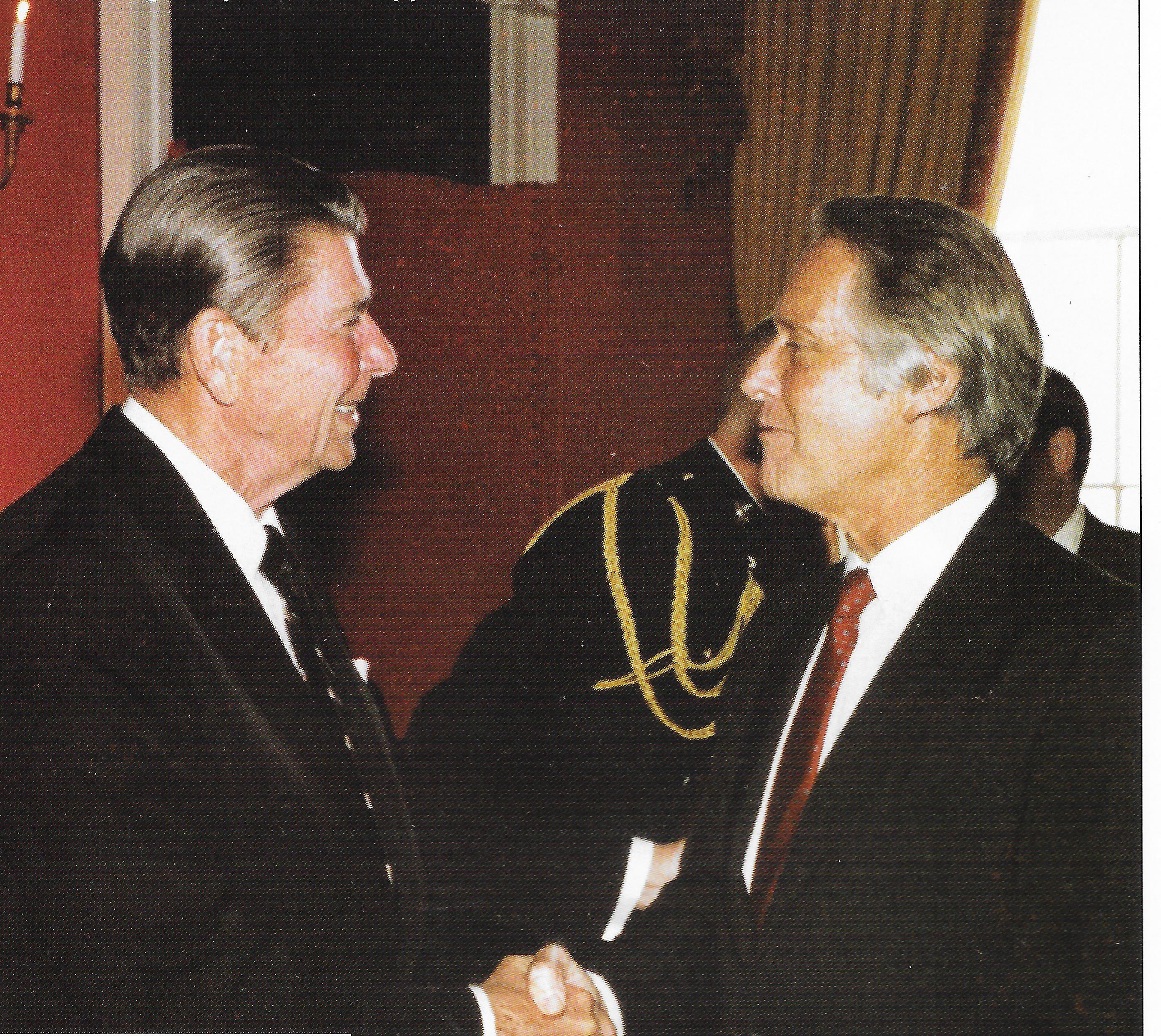
Ronald Reagan meets Perry Hooper













